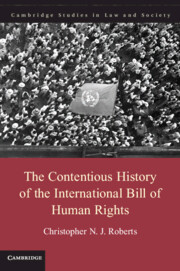Book contents
- Frontmatter
- Contents
- Preface
- Acknowledgments
- Introduction
- Chapter 1 What Are Human Rights and Where Do They Come from?
- Chapter 2 From War and Politics to Human Rights: The Cold War and Colonial Recession
- Chapter 3 Protecting State Sovereignty from the “Dangers” of Human Rights
- Chapter 4 Saving Empire: The Attempt to Create (Non)-Universal Human Rights
- Chapter 5 A Human Rights Treaty that Permits Lynching?
- Chapter 6 The United States’ Unequivocal Ambivalence toward Socioeconomic Rights
- Epilogue
- Index
Preface
Published online by Cambridge University Press: 05 November 2014
- Frontmatter
- Contents
- Preface
- Acknowledgments
- Introduction
- Chapter 1 What Are Human Rights and Where Do They Come from?
- Chapter 2 From War and Politics to Human Rights: The Cold War and Colonial Recession
- Chapter 3 Protecting State Sovereignty from the “Dangers” of Human Rights
- Chapter 4 Saving Empire: The Attempt to Create (Non)-Universal Human Rights
- Chapter 5 A Human Rights Treaty that Permits Lynching?
- Chapter 6 The United States’ Unequivocal Ambivalence toward Socioeconomic Rights
- Epilogue
- Index
Summary
The International Bill of Human Rights comprises three principal human rights texts: the Universal Declaration of Human Rights; the International Covenant on Civil and Political Rights; and the International Covenant on Economic, Social, and Cultural Rights. Together, these three documents are the foundation of the modern system of international human rights. Although historians have written volumes on the development of the Universal Declaration of Human Rights, much less is known about the creation of the other two-thirds of this human rights triumvirate. Entire swaths of this history have been lost from memory, crucial pieces of the human rights concept have been elided from our minds, and rights-bearers often remain rightless. This book attempts to reconnect them.
The Palace that stands today emerged on the eve of a second Great War. Its two column-laced white wings bolt skyward from the semicircular foundation it inherited from the past. A broad, open-air concourse splits the edifice into two halves, with its vast theater ensconced below. It was within this space – the Great Hall of the Palais de Chaillot – that in 1948 the Universal Declaration of Human Rights came into being.
The monumental Palais now shares its history with the foundational text of the modern international system of human rights.
- Type
- Chapter
- Information
- Publisher: Cambridge University PressPrint publication year: 2014



